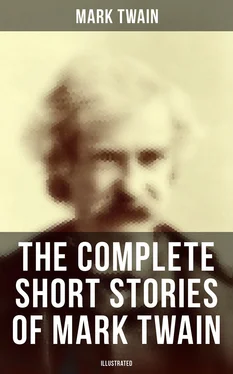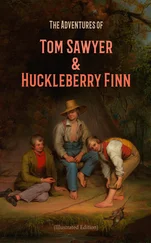“Very good. As to quantity?”
“Put it down five to fifteen barrels – his thirst varies; his other appetites do not.”
“These things are unusual. They ought to furnish quite good clues toward tracing him.”
He touched the bell.
“Alaric; summon Captain Burns.”
Burns appeared. Inspector Blunt unfolded the whole matter to him, detail by detail. Then he said in the clear, decisive tones of a man whose plans are clearly defined in his head and who is accustomed to command:
“Captain Burns, detail Detectives Jones, Davis, Halsey, Bates, and Hackett to shadow the elephant.”
“Yes, sir.”
“Detail Detectives Moses, Dakin, Murphy, Rogers, Tupper, Higgins, and Bartholomew to shadow the thieves.”
“Yes, sir.”
“Place a strong guard – a guard of thirty picked men, with a relief of thirty – over the place from whence the elephant was stolen, to keep strict watch there night and day, and allow none to approach – except reporters – without written authority from me.”
“Yes, sir.”
“Place detectives in plain clothes in the railway; steamship, and ferry depôts, and upon all roadways leading out of Jersey City, with orders to search all suspicious persons.”
“Yes, sir.”
“Furnish all these men with photograph and accompanying description of the elephant, and instruct them to search all trains and outgoing ferry-boats and other vessels.”
“Yes, sir.”
“If the elephant should be found, let him be seized, and the information forwarded to me by telegraph.”
“Yes, sir.”
“Let me be informed at once if any clues should be found – footprints of the animal, or anything of that kind.”
“Yes, sir.”
“Get an order commanding the harbor police to patrol the frontages vigilantly.”
“Yes, sir.”
“Despatch detectives in plain clothes over all the railways, north as far as Canada, west as far as Ohio, south as far as Washington.”
“Yes, sir.”
“Place experts in all the telegraph offices to listen in to all messages; and let them require that all cipher despatches be interpreted to them.”
“Yes, sir.”
“Let all these things be done with the utmost secrecy – mind, the most impenetrable secrecy.”
“Yes, sir.”
“Report to me promptly at the usual hour.”
“Yes, sir.”
“Go!”
“Yes, sir.”
He was gone.
Inspector Blunt was silent and thoughtful a moment, while the fire in his eye cooled down and faded out. Then he turned to me and said in a placid voice:
“I am not given to boasting, it is not my habit; but— we shall find the elephant.”
I shook him warmly by the hand and thanked him; and I felt my thanks, too. The more I had seen of the man the more I liked him and the more I admired him and marveled over the mysterious wonders of his profession. Then we parted for the night, and I went home with a far happier heart than I had carried with me to his office.
Table of Contents
Next morning it was all in the newspapers, in the minutest detail. It even had additions – consisting of Detective This, Detective That, and Detective The Other’s “Theory” as to how the robbery was done, who the robbers were, and whither they had flown with their booty. There were eleven of these theories, and they covered all the possibilities; and this single fact shows what independent thinkers detectives are. No two theories were alike, or even much resembled each other, save in one striking particular, and in that one all the other eleven theories were absolutely agreed. That was, that although the rear of my building was torn out and the only door remained locked, the elephant had not been removed through the rent, but by some other (undiscovered) outlet. All agreed that the robbers had made that rent only to mislead the detectives. That never would have occurred to me or to any other layman, perhaps, but it had not deceived the detectives for a moment. Thus, what I had supposed was the only thing that had no mystery about it was in fact the very thing I had gone furthest astray in. The eleven theories all named the supposed robbers, but no two named the same robbers; the total number of suspected persons was thirty-seven. The various newspaper accounts all closed with the most important opinion of all – that of Chief Inspector Blunt. A portion of this statement read as follows:
The chief knows who the two principals are, namely, “Brick” Daffy and “Red” McFadden. Ten days before the robbery was achieved he was already aware that it was to be attempted, and had quietly proceeded to shadow these two noted villains; but unfortunately on the night in question their track was lost, and before it could be found again the bird was flown – that is, the elephant.
Daffy and McFadden are the boldest scoundrels in the profession; the chief has reasons for believing that they are the men who stole the stove out of the detective headquarters on a bitter night last winter – in consequence of which the chief and every detective present were in the hands of the physicians before morning, some with frozen feet, others with frozen fingers, ears, and other members.
When I read the first half of that I was more astonished than ever at the wonderful sagacity of this strange man. He not only saw everything in the present with a clear eye, but even the future could not be hidden from him. I was soon at his office, and said I could not help wishing he had had those men arrested, and so prevented the trouble and loss; but his reply was simple and unanswerable:
“It is not our province to prevent crime, but to punish it. We cannot punish it until it is committed.”
I remarked that the secrecy with which we had begun had been marred by the newspapers; not only all our facts but all our plans and purposes had been revealed; even all the suspected persons had been named; these would doubtless disguise themselves now, or go into hiding.
“Let them. They will find that when I am ready for them my hand will descend upon them, in their secret places, as unerringly as the hand of fate. As to the newspapers, we must keep in with them. Fame, reputation, constant public mention – these are the detective’s bread and butter. He must publish his facts, else he will be supposed to have none; he must publish his theory, for nothing is so strange or striking as a detective’s theory, or brings him so much wonderful respect; we must publish our plans, for these the journals insist upon having, and we could not deny them without offending. We must constantly show the public what we are doing, or they will believe we are doing nothing. It is much pleasanter to have a newspaper say, ‘Inspector Blunt’s ingenious and extraordinary theory is as follows,’ than to have it say some harsh thing, or, worse still, some sarcastic one.”
“I see the force of what you say. But I noticed that in one part of your remarks in the papers this morning you refused to reveal your opinion upon a certain minor point.”
“Yes, we always do that; it has a good effect. Besides, I had not formed any opinion on that point, anyway.”
I deposited a considerable sum of money with the inspector, to meet current expenses, and sat down to wait for news. We were expecting the telegrams to begin to arrive at any moment now. Meantime I reread the newspapers and also our descriptive circular, and observed that our twenty-five thousand dollars reward seemed to be offered only to detectives. I said I thought it ought to be offered to anybody who would catch the elephant. The inspector said:
“It is the detectives who will find the elephant; hence the reward will go to the right place. If other people found the animal, it would only be by watching the detectives and taking advantage of clues and indications stolen from them, and that would entitle the detectives to the reward, after all. The proper office of a reward is to stimulate the men who deliver up their time and their trained sagacities to this sort of work, and not to confer benefits upon chance citizens who stumble upon a capture without having earned the benefits by their own merits and labors.”
Читать дальше












